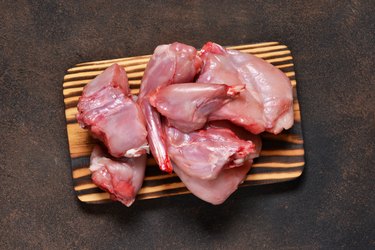
Rabbit meat is lean, similar to chicken, and goes well in stews, soups and casseroles. It's significantly leaner and higher in protein compared to other meats, making it ideal for dieters and healthy eaters alike.
Tip
Due to its low fat content, rabbit meat can make it easier to reduce your calorie intake without giving up flavor. It's just as nutritious as fish and higher in protein than many cuts of beef.
Video of the Day
Rabbit Meat Nutrition
Chances are that you can't find rabbit meat at your local grocery store. Unlike chicken, beef and pork, rabbit isn't commonly consumed. It's classified as game meat, so its taste won't rival that of a premium beef cut. However, it's lean, packed with protein and tasty.
Video of the Day
The diet and lifestyle of rabbits contribute to their low body fat levels. Unlike cows, which are slow-moving and sedentary, rabbits are fast and mobile. They eat a diet of fibrous foods like roots, seeds and grains.
A 3-ounce serving of wild, uncooked rabbit has only 96 calories, according to the USDA. It also delivers about 18 grams of protein, fewer than 2 grams of fat and no carbohydrates. Compared to other meats, particularly beef, rabbit has very little fat.
The same amount of raw chicken provides 94 calories, slightly less than rabbit meat. You will also get 17 grams of protein, 2.3 grams of fat and no carbs. Chicken is considered one of the leanest meats, but rabbit has slightly less fat and more protein.
Ground beef, by comparison, is higher in calories and fat. This type of meat provides 210 calories, 15 grams of protein, 15 grams of fat and zero carbs. Compared to chicken and rabbit, beef is incredibly fatty.
Reduce Your Fat Intake
The consumption of lean meat, including rabbit, makes it easier to cut calories. Fat contains more than twice as many calories as protein and carbs. One gram of this nutrient provides 9 calories, while protein and carbohydrates supply 4 calories per gram.
Eating too much fat can quickly increase your daily calorie intake. The key to weight loss is to eat fewer calories than you burn. This concept is known as energy balance, or if you want to tip the balance in favor of fat loss, you need to eat less, exercise more or both.
The types of fat you eat matter too when it comes to overall health. Monounsaturated and polyunsaturated fats have numerous benefits, according to an August 2017 study published in the Nutrition Journal. As the researchers note, simply reducing fat intake doesn't make a difference in cardiovascular disease risk. Instead, the focus should be on eating less saturated fat and replacing it with unsaturated fats.
Saturated fat largely comes from animal sources, such as pork, beef and dairy foods. Replacing fatty meats with rabbit will help you lower your saturated fat intake without sacrificing the amount of protein you get.
Read more: Is Chicken High in Cholesterol?
Weight loss isn't the only reason to switch to rabbit meat as a source of protein. A January 2015 study published in the International Journal of Pharmacy & Biomedical Research states that rabbits are just as nutritious as fish. However, rabbit has yet to be widely adopted as a primary source of meat. These animals reproduce and grow quickly and consume little grain compared to other livestock.
Animals like cows and pigs take longer to mature than rabbits, cost more to feed and are slower to reproduce. Therefore, developing countries that have a shortage of animal protein may benefit from switching to rabbit meat as a food source. In many countries, this product costs roughly the same as chicken or other chicken parts, which means that price is not a barrier.
- International Journal of Pharmacy & Biomedical Research: "Rabbit Meat Has the Potential of Being a Possible Alternative to Other Meats as a Protein Source: A Brief Review"
- Nutrition Journal: "A Healthy Approach to Dietary Fats: Understanding the Science and Taking Action to Reduce Consumer Confusion"
- National Heart, Lung, and Blood Institute: "Balance Food and Activity"
- U.S. Department of Agriculture: "How Many Calories Are in One Gram of Fat, Carbohydrate, or Protein?"
- USDA FoodData Central: "Ground Beef, Raw"
- USDA FoodData Central: "Chicken, Roasting, Meat Only, Raw"
- USDA FoodData Central: "Game Meat, Rabbit, Wild, Raw"
- Michigan State University: "Rabbit Tracks: Feeds and Feeding"